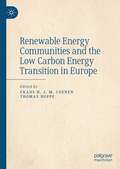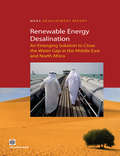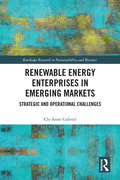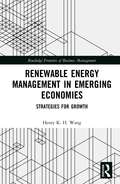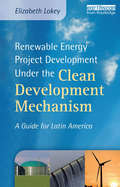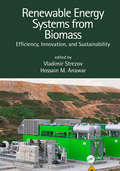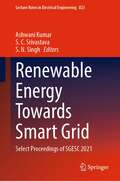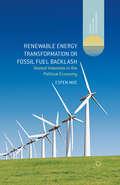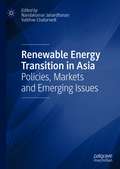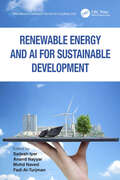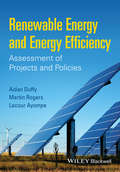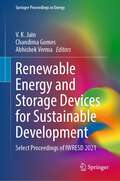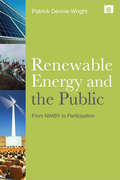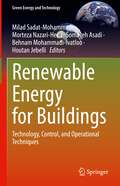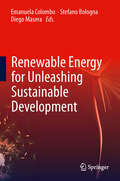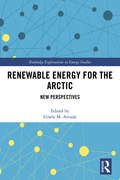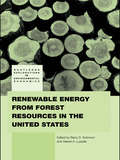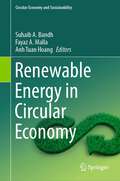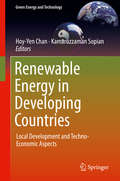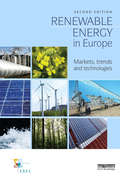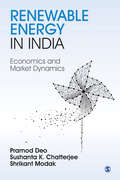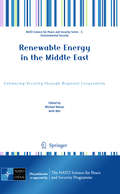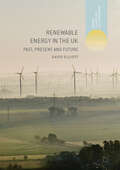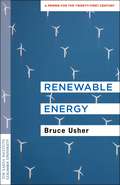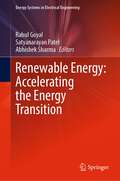- Table View
- List View
Renewable Energy Communities and the Low Carbon Energy Transition in Europe
by Thomas Hoppe Frans H. J. M. CoenenThis volume addresses renewable energy communities, and in particular renewable energy cooperatives (REScoops), in the context of the revised EU Renewables Directive. It provides a comprehensive account of the history and development of the renewable energy community movement in over six different countries of continental Europe. It addresses their visions, strategy, organisation, agency, and more particularly the challenges they encounter. This is of particular importance to gain more understanding into how renewable energy communities fare in domestic energy markets where they are confronted with regime institutions, structures and incumbents’ agency that tend to favour maintaining of the status quo while blocking attempts to empower and institutionalise renewable energy communities as market entrants having a disruptive, radical green and localist agenda. This volume will be an invaluable reference for academics and practitioners with an interest in social innovation in sustainable transitions, the role of community energy in energy markets, their agency, as well as an outlook to the impact that the EU Renewables Directive may have to change national legislation and policy frameworks to create a level playing field that is essentially more fair and beneficial to renewable energy communities.
Renewable Energy Desalination
by Bekele Debele NegewoThe Middle East and North Africa (MENA) Region is one of the most water stressed regions in the world. Water scarcity has already become a challenge to development in many of the countries. Due to increasing population and Projected climate change impacts, MENA's annual water demand gap is projected to grow five-fold by 2050, from today's 42 Km3 to 200 km3 by 2050. Despite its extreme scarcity, water is managed poorly. Inefficiencies are common in the agriculture, municipal and industrial systems; and many utilities are financially unsustainable. As a result, countries overexploit their fossil aquifers-and use desalination by fossil fuel-to meet the water demand gap. Desalination already plays a critical role in MENA's water supply portfolio. However, desalination is costly, energy intensive and has environmental impacts. On current trends, the projection is that, by 2050, Saudi Arabia and many other countries in the Region will consume for desalination most of the oil that they produce. Overexploitation of fossil aquifers is not sustainable. Neither is the use of fossil fuel for desalination to meet the growing water gap sustainable. This book outlines the challenges in terms of water (and also in terms of energy) that countries in the Region face and analyzes the scope of available options to address the growing water gap. The book estimates MENA's water gap today and into the future-until 2050; and presents a methodology to prioritize options to bridge the water gap, using the 'marginal cost of water' approach. The book also assesses the viability of renewable energy desalination as an important option to close the Region's water gap. The book compares the economic cost of desalination using fossil fuel and renewable energy sources, in particular the Concentrated Solar Power (CSP). The book also provides recommendations as to how CSP based desalination could ensure sustainable water supply for the Region.
Renewable Energy Enterprises in Emerging Markets: Strategic and Operational Challenges (Routledge Research in Sustainability and Business)
by Cle-Anne GabrielThis book highlights the challenges faced by renewable energy enterprises (REEs) in emerging markets, by reflecting on the enterprises&’ own stories and experiences. Research into REEs has focused largely on successful businesses and business models, and developed markets. With significant opportunities for renewable energy enterprise in emerging markets, this book presents a unique business-level perspective. It highlights the key barriers and outlines the strategic and operational solutions for success articulated by the entrepreneurs themselves. The research draws on interviews with entrepreneurs in twenty-eight emerging markets, including Barbados, Cambodia, Chile, Ghana, Indonesia, India, Kenya, South Africa and Uganda. The book concludes by summarising the key solutions for success and illustrating how successful REEs put them into practice. This book will be of great interest to students and scholars of renewable energy, sustainable business and the sustainability agenda in emerging markets.
Renewable Energy Management in Emerging Economies: Strategies for Growth (Routledge Frontiers of Business Management)
by Henry K. WangRenewable energy has never been more important than it is today, as climate change becomes arguably the world’s most essential problem to be solved. Solving this problem is proving difficult and complex – none more so than for emerging economies that are undergoing rapid economic development with increasing use of fossil fuels. There are many challenges for these countries that are making efforts to promote renewable energy use, with limited resources. Good government policies and corporate strategies are essential to support these efforts as a part of the global climate change crisis. This important book addresses the very latest developments in renewable energy management plus the key challenges and risks. Potential new policies and strategies for the further growth of renewable energies in emerging economies, together with high-level business case examples of renewable management in emerging economies, are addressed. This book is essential reading for policy makers, government employees, business executives, professionals, researchers and academics looking to improve global renewable energy policies, investments and management.
Renewable Energy Project Development Under the Clean Development Mechanism: A Guide for Latin America (Environmental Market Insights)
by Elizabeth LokeyThis definitive guide to developing renewable energy CDM projects in Latin America - the largest market on the doorstep of the United States - provides business leaders, investors, project developers and host country offices with the one-stop guide to successful CDM renewable energy project development. The book opens with an accessible guide to the CDM that explains what it is and how it works in both theory and practice with a step-by-step guide for investors, project developers, consultants and Designated National Authorities (DNAs). The book then provides valuable country-by-country market analysis of Latin America with a focus on the electrical sector, renewable energy incentives and the overall investment climate that provides an authoritative guide to the most and least favourable places to develop projects. The final section provides guidance for how to overcome the identified barriers with practical actions for successful project development.
Renewable Energy Systems from Biomass: Efficiency, Innovation and Sustainability
by Vladimir Strezov and Hossain M. AnawarNew innovations are needed for the invention of more efficient, affordable, sustainable and renewable energy systems, as well as for the mitigation of climate change and global environmental issues. In response to a fast-growing interest in the realm of renewable energy, Renewable Energy Systems: Efficiency, Innovation and Sustainability identifies a need to synthesize relevant and up-to-date information in a single volume. This book describes a systems approach to renewable energy, including technological, political, economic, social and environmental viewpoints, as well as policies and benefits. This unique and concise text, encompassing all aspects of the field in a single source, focuses on truly promising innovative and affordable renewable energy systems. Key Features: Focuses on innovations in renewable energy systems that are affordable and sustainable Collates the most relevant and up-to-date information on renewable energy systems, in a single and unique volume Discusses lifecycle assessment, cost and availability of systems Emphasizes bio-related topics Provides a systems approach to the renewable energy technologies and discusses technological, political, economic, social, and environmental viewpoints as well as policies
Renewable Energy Towards Smart Grid: Select Proceedings of SGESC 2021 (Lecture Notes in Electrical Engineering #823)
by Ashwani Kumar S. N. Singh S. C. SrivastavaThe book contains select proceedings of the International Conference on Smart Grid Energy Systems and Control (SGESC 2021). The proceedings is divided into 03 volumes, and this volume focuses on renewable energy towards the smart grid. It includes papers related to smart grid, renewable energy, its integration, and DERs in the network for better energy management and ancillary services. The book presents cutting-edge research in the emerging fields of micro, nano, and smart devices and systems from experts. Most of the contributors have built devices or systems or developed processes or algorithms in these areas. This book is a unique collection of chapters from different areas with a common theme and will be immensely useful to academic researchers and practitioners in the industry.
Renewable Energy Transformation or Fossil Fuel Backlash: Vested Interests in the Political Economy (Energy, Climate and the Environment)
by Espen MoeRenewable energy is rising within an energy system dominated by powerful vested energy interests in fossil fuels, nuclear and electric utilities. Analyzing renewables in six very different countries, the author argues that it is the extent to which states have controlled these vested interests that determines the success or failure of renewables.
Renewable Energy Transition in Asia: Policies, Markets and Emerging Issues
by Nandakumar Janardhanan Vaibhav ChaturvediThis book covers critical debates on policies, markets and emerging issues that shape renewable energy transition in the Asian region, which is fast becoming an epicenter of the global energy consumption. The chapters focus on domestic policies, geopolitics, technology landscape and governance structure pertaining to the development of renewable energy in different Asian countries ranging from China to the Middle East. The book presents an insightful view of the pace and magnitude of the energy transition. It presents critical steps countries are taking to promote affordable and clean energy (SDG 7) as well as strengthening climate mitigation actions (SDG 13). In addition, this book introduces the concept of co-innovation---a collaborative and iterative approach to jointly innovate, manufacture and scale up low-carbon technologies---and its role in promoting energy transition in Asia. Chapter 8 (Renewable energy deployment to stimulate energy transition in the Gulf Cooperation Council) is available open access under a Creative Commons Attribution 4.0 International License via link.springer.com.
Renewable Energy and AI for Sustainable Development (Innovations in Intelligent Internet of Everything (IoE))
by Fadi Al-Turjman Anand Nayyar Mohd Naved Sailesh IyerElectronic device usage has increased considerably in the past two decades. System configurations are continuously requiring upgrades; existing systems often become obsolete in a matter of 2–3 years. Green computing is the complete effective management of design, manufacture, use, and disposal, involving as little environmental impact as possible. This book intends to explore new and innovative ways of conserving energy, effective e-waste management, and renewable energy sources to harness and nurture a sustainable eco-friendly environment. This book: • Highlights innovative principles and practices using effective e-waste management and disposal • Explores artificial intelligence based sustainable models • Discovers alternative sources and mechanisms for minimizing environmental hazards • Highlights successful case studies in alternative sources of energy • Presents solid illustrations, mathematical equations, as well as practical in-the-field applications • Serves as a one-stop reference guide to stakeholders in the domain of green computing, e-waste management, renewable energy alternatives, green transformational leadership including theory concepts, practice and case studies • Explores cutting-edge technologies like internet of energy and artificial intelligence, especially the role of machine learning and deep learning in renewable energy and creating a sustainable ecosystem • Explores futuristic trends in renewable energy This book aims to address the increasing interest in reducing the environmental impact of energy as well as its further development and will act as a useful reference for engineers, architects, and technicians interested in and working with energy systems; scientists and engineers in developing countries; industries, manufacturers, inventors, universities, researchers, and interested consultants to explain the foundation to advanced concepts and research trends in the domain of renewable energy and sustainable computing. The content coverage of the book is organized in the form of 11 clear and thorough chapters providing a comprehensive view of the global renewable energy scenario, as well as how science and technology can play a vital role in renewable energy.
Renewable Energy and Energy Efficiency
by Martin Rogers Aidan Duffy Lacour AyompeThe recent rise to prominence of renewable energy and energy efficiency has been driven by their potential to lower the environmental impacts of energy use. As these technologies mature they must demonstrate not only their environmental benefits, but also their economic competitiveness. The relative costs and benefits of each potential project, whether large or small, must be systematically modelled and assessed before they can be financed and implemented.Renewable Energy and Energy Efficiency: Assessment of Projects and Policies deals with the appraisal of such projects against financial and non-financial criteria, illustrating the assessment tools necessary to make appropriate, evidence based decisions as efficiently as possible. The most important technologies are first described, stressing their economic and performance characteristics. Key project appraisal concepts are then introduced, approaches to modelling the cash flows in energy projects are described, and the issues of uncertainty and optimisation are fully discussed. These financial concepts, together with methods for estimating greenhouse gas emissions, are extended to address aspects of energy policy. Illustrated with many case studies this is an ideal introduction to financial and non-financial appraisal techniques as applied to energy efficient and renewable energy technologies.
Renewable Energy and Storage Devices for Sustainable Development: Select Proceedings of IWRESD 2021 (Springer Proceedings in Energy)
by Abhishek Verma V. K. Jain Chandima GomesThe book contains selected and peer-reviewed papers presented during the ‘International Workshop on Renewable Energy and Storage Devices for Sustainable Development’ (IWRESD-2021). The book covers recent research on various applications and scientific developments in the areas of renewable energy. These topics are solar cells, sustainable energy conversion, processing technologies, instrumentation, energy storage devices, solar thermal applications, batteries, new materials, and processes to develop low-cost renewable energy-based technologies, etc. This book will be of interest to researchers and engineers across a variety of fields.
Renewable Energy and the Public: From NIMBY to Participation
by Patrick Devine-WrightThroughout the world, the threat of climate change is pressing governments to accelerate the deployment of technologies to generate low carbon electricity or heat. But this is frequently leading to controversy, as energy and planning policies are revised to support new energy sources or technologies (e.g. offshore wind, tidal, bioenergy or hydrogen energy) and communities face the prospect of unfamiliar, often large-scale energy technologies being sited near to their homes. Policy makers in many countries face tensions between 'streamlining' planning procedures, engaging with diverse publics to address what is commonly conceived as 'NIMBY' (not in my back yard) opposition, and the need to maintain democratic, participatory values in planning systems. This volume provides a timely, international review of research on public engagement, in contexts of diverse, innovative energy technologies. Public engagement is conceived broadly - as the interaction between how developers and other key actors engage with publics about energy technologies (including assumptions held about the methods used, such as the provision of financial benefits or the holding of deliberative events), and how individuals and groups engage with energy policies and projects (including indirectly through the media and directly through emotional and behavioural responses). The book's contributors are leading experts in the UK, Europe, North and South America and Australia drawn from a variety of relevant social science disciplinary perspectives. The book makes a significant contribution to our existing knowledge, as well as providing interested professionals, policymakers and members of the public with a timely overview of the critical issues involved in public engagement with low carbon energy technologies.
Renewable Energy for Buildings: Technology, Control, and Operational Techniques (Green Energy and Technology)
by Behnam Mohammadi-Ivatloo Morteza Nazari-Heris Somayeh Asadi Houtan Jebelli Milad Sadat-MohammadiThe book covers practical applications and experimental results of integrating renewable energy technologies, energy storage facilities, and intelligent control and operation techniques into building energy systems. It introduces practical approaches to improving the energy systems of buildings in order to reduce energy consumption and cost. Renewable Energy for Buildings is suitable for retrofit engineers, energy engineers, and professionals, as well as researchers and developers in electrical engineering, architectural engineering, and mechanical engineering. Moreover, it can be used by undergraduate and graduate students to become familiar with the most recent developments in building energy systems.Examines the most recent developments in building energy systems;Looks at practical applications and theoretical aspects; Includes case studies.
Renewable Energy for Unleashing Sustainable Development
by Emanuela Colombo Stefano Bologna Diego MaseraThe book analyzes energy technologies, business models and policies to promote sustainable development. It proposes a set of recommendations for further activities and networking on access to energy and renewable energies and promotes an integrated approach to sustainable resource management. The book discusses access to energy, as a precondition for socio-economic progress. It depicts the global dimension of the challenge in terms of access to electricity and other forms of energy in developing countries. The three main interlinked topics related to energy and sustainable growth are separately discussed: appropriate technologies for modern energy services, business models for the development of new energy markets, and policies to support new energy systems. The description of activities and programmes of some public and private Italian stakeholders is also included.
Renewable Energy for the Arctic: New Perspectives (Routledge Explorations in Energy Studies)
by Gisele ArrudaThis book explores various facets of the transition to renewable energy in the Arctic region. It critically examines the adverse effects of fossil fuel extraction and use, environmental and social impacts of climate change, and the possibility of a low carbon energy system through innovation and technology. Drawing together a diverse range of contributors and considering a range of new energy sources, this volume also looks at the scale of the transition challenges in the Arctic energy production and use, the necessary flexibility to balance energy demand and supply, the need of a more integrated energy infrastructure, and the new energy business models, health and safety, and quality standards for the region. Finally, it examines the transit and influence between Arctic and non-Arctic countries, in terms of growth, partnerships and new dynamics of a transitioning process to a sustainable energy system. Focusing on specific case studies that represent the most relevant energy projects in the region, this book will be of great interest to students and scholars of energy policy and transitions, climate change, global business and sustainable development.
Renewable Energy from Forest Resources in the United States (Routledge Explorations in Environmental Economics)
by Barry D. Solomon Valerie A. LuzadisInterest in biomass energy resources from forests, farms and other sources has been rapidly increasing in recent years because of growing concern with reducing carbon dioxide emissions and developing alternatives to increasingly scarce, expensive and insecure oil supplies. The uniqueness of this book is its coverage of biomass energy markets in the US from an economic as well as technical perspective. Existing books typically focus on single markets or technical aspects at the exclusion of economics, and have given greater coverage to biomass energy outside the US. This edited collection has three main parts. Part One provides a historical overview of forest biomass energy use in the US; the major technologies, economics, market prospects, and policies. Part Two presents forest biomass energy assessments, including life cycle and sustainability perspectives, and Part Three includes five sets of regional case studies. After reviewing the history of wood energy use in the US and technology options, the book shows that forests could displace sixteen per cent of domestic transportation fuel use in 2030. Renewable Energy from Forest Resources in the United States includes a Foreword from Chris Flavin, President of the Worldwatch Institute.
Renewable Energy in Circular Economy (Circular Economy and Sustainability)
by Suhaib A. Bandh Anh Tuan Hoang Fayaz A. MallaThe book provides a comprehensive overview of the technologies and processes involved in renewable energy generation, with a specific focus on their role in improving the circular economy. It offers all the necessary information and tools to help readers select the most sustainable renewable energy solution for different conditions.Exploring real-life examples, the book delves into the practical applications of the circular economy in the renewable energy sector. It takes a multi-faceted approach, examining the circular economy from various perspectives and incorporating methods such as lifecycle assessment, sustainability assessment, multi-criteria decision-making, and multi-objective optimization modes. Furthermore, the book explores the concept of blockchain, hybrid renewable energy models, technologies, and implementation. It also investigates the critical factors and key enablers that influence sustainable development in this field. By doing so, it not only facilitates the transition to a circular economy but also highlights the shift in recent research, trends, and attitudes towards a more scientifically grounded approach.The primary objective of this book is to compile research specifically focused on the circular economy in renewable energy. By providing researchers and policymakers in the energy sector with the necessary scientific methodology and metrics, it enables the development of strategies for a sustainable transition. This book serves as a valuable resource for students, researchers, and practitioners seeking to deepen their understanding of energy planning and the current and future trends of biofuel as an alternative fuel.
Renewable Energy in Developing Countries: Local Development And Techno-economic (Green Energy and Technology)
by Hoy-Yen Chan Kamaruzzaman SopianThis book discusses aspects of policy and techno-economic analysis of renewable energy in developing countries. Renewable energy technologies have been one of the most important strategies in addressing sustainable energy development and climate change. The roles of renewable energy in developing countries are vital, which include the accessibility of modern energy services in rural areas, climate change mitigation, energy security, green job creation and eventually improvement of quality of life. Part I of this book focuses on policy and strategy, while Part II focuses on technology development and feasibility. Chapters are contributed by leading experts from the ASEAN Center of Energy, government agencies, industries, and universities from five developing countries, including Malaysia, Indonesia, Vietnam, Brunei Darussalam and Bangladesh.
Renewable Energy in Europe: Markets, Trends and Technologies
by European Renewable European Renewable Energy CouncilHow can the European Union meet its binding 20% renewable energy target in final energy consumption by the year 2020? Which sources offer the best prospects for realizing this goal? These are the questions answered by this key book which analyses the current situation of renewable energy in Europe, examines the latest technological, financial and economic developments, and outlines ways in which the renewable energy market can be developed. The book is divided into sections examining the integration of renewable energy, electricity, heating and cooling as well as biofuels. All the main technologies are covered, with exploration of: ' benefits and applications ' costs and prices ' markets and installed capacity ' policy instruments ' key countries and success stories ' targets and long term potential This will be essential reading for policy decision-makers at all levels and to all those involved in the development of the renewable energy industry.
Renewable Energy in India: Economics and Market Dynamics
by Pramod Deo Sushanta K Chatterjee Shrikant ModakThe scope of renewable energy generation technologies has far exceeded that of a laboratory, as they now require large-scale commercial generation. With them relying heavily on policy support, contemporary debates in energy are grappling with how exactly renewable energy should be priced and integrated into market. This book, written from an economics perspective, critically examines the aspects of pricing, regulatory oversight and rules governing the market for electricity generation from intermittent renewable energy sources and associated green product. This book discusses various policy and regulatory initiatives for renewable power generation technologies in India by comparing them with similar measures in some leading countries of the world. It contextualizes the pricing of renewable energy and looks at market-determined renewable energy certificate (REC) mechanism. Finally, it seeks to advance scholarship on green energy and introspects on policy dilemma facing the renewable segment in India and explores the possibility of achieving a level playing field for renewable energy vis-à-vis traditional methods of power generation, through appropriate market mechanism.
Renewable Energy in the Middle East
by Michael Mason Amit MorEnergy insecurity is not normally associated with the Middle East. However, away from the oil-rich Persian Gulf, the countries of the eastern Mediterranean are particularly vulnerable. Their fossil fuel endowments are low, while their fractious relationships with each other have long fostered wider political insecurities. Focusing on the Jordan Basin (Israel, the Palestinian Territories, Lebanon and Jordan), this timely volume addresses the prospects for the adoption of renewable energy in the oil-poor Middle East. Featuring regional energy experts, it offers an invaluable survey. After outlining the regional security context, this book first reviews renewable energy policy and practices in the Jordan Basin. It then considers options for greening energy use, including promising pilot projects in North Africa. The initiatives discussed encompass renewable energy finance, energy-efficient rural communities, and solar and wind energy. There is significant potential for an increase in the uptake of renewable energy technologies in the eastern Mediterranean. This window of opportunity has been created by high oil prices, energy infrastructure investment opportunities, and the UN climate change regime. In conclusion, the book considers the institutional conditions for collaborative decision-making on renewable energy. Such cooperation would deliver substantial security and human development benefits to the region, and indeed the world.
Renewable Energy in the UK: Past, Present and Future (Energy, Climate and the Environment)
by David ElliottThis book offers a detailed account of how renewable energy has moved from the margins to the mainstream in the UK, and of the battles that have been fought to achieve this, trawling through the often troubled history of government involvement. The book examines how renewables became what now seem likely to be the dominant energy sources of the future. Renewable energy technologies, using solar and wind power and other natural energy sources, are now supplying around 30% of UK electricity and appear set to continue expanding to supply around 50% within the next decade. Although the emphasis of the book is on the UK, developments there are compared with those in other countries to provide an overall assessment of the relevance of the UK experience. Chapters explore why the UK still lags behind many other countries in deploying renewables, in part, it is argued, due to its continued reliance on nuclear power. The book ends with a discussion on what sort of changes may be expected over the coming years. The author does not assume a single answer, but invites readers to consider the possibilities.
Renewable Energy: A Primer for the Twenty-First Century (Columbia University Earth Institute Sustainability Primers)
by Professor Bruce UsherFrom wood to coal to oil and gas, the sources of energy on which civilization depends have always changed as technology advances. Now renewables are overtaking fossil fuels, with wind and solar energy becoming cheaper and more competitive every year. Growth in renewable energy will further accelerate as electric vehicles become less expensive than traditional automobiles. Understanding the implications of the energy transition will prepare us for the many changes ahead.This book is a primer for readers of all levels on the coming energy transition and its global consequences. Bruce Usher provides a concise yet comprehensive explanation for the extraordinary growth in wind and solar energy; the trajectory of the transition from fossil fuels to renewables; and the implications for industries, countries, and the climate. Written in a straightforward style with easy-to-understand visual aids, the book illuminates the strengths and weaknesses of renewable energy based on business fundamentals and analysis of the economic forces that have given renewables a tailwind. Usher dissects the winners and losers, illustrating how governments and businesses with a far-sighted approach will reap long-term benefits while others will trail behind. Alongside the business and finance case for renewable energy, he provides a timely illustration of the threat of catastrophic climate change and the perils of delay. A short and powerful guide to our energy present and future, this book makes it clear that, from both economic and environmental perspectives, there is no time to lose.
Renewable Energy: Accelerating the Energy Transition (Energy Systems in Electrical Engineering)
by Rahul Goyal Abhishek Sharma Satyanarayan PatelThis book reveals key challenges to ensuring the secure and sustainable production and use of energy resources and provides corresponding solutions. This book covers the advanced technologies applied in renewable energy generation, energy storage, an alternative to petroleum fuels, waste to energy, solar energy, the impact of fossil fuel combustion on the environment, green buildings, social sustainability, etc. It goes beyond theory and describes practical challenges and solutions associated with energy and sustainability. This book is of particular interest to graduate students and academic or industrial researchers/professionals working in renewable energy, sustainability, bioenergy, and mechanical and automobile engineering. This book makes a forceful foundation for the establishment of the role of renewable energy in energy transition for a sustainable, cleaner, and greener future. This book is unique compared to other available books because it covers a wide variety of topics on a single platform.
